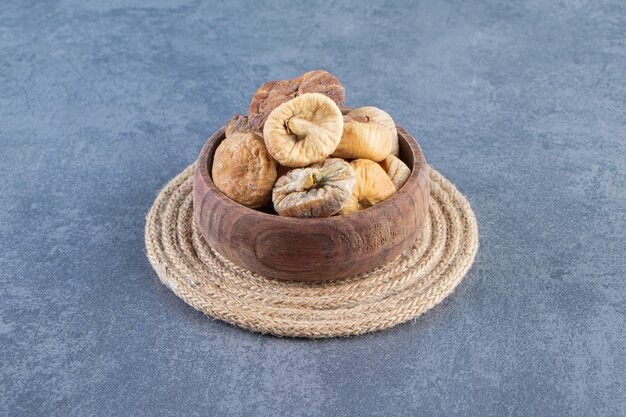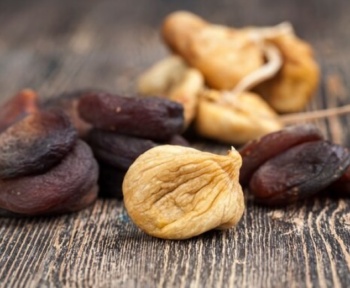Introduction
Dried figs have gained popularity as a nutritious snack and natural sweetener. Rich in fiber, antioxidants, and essential vitamins, they provide myriad health benefits. In this article, we’ll delve into the dried figs’0 health benefits of doing and why you should consider incorporating them into your diet. We’ll also explore the best ways to use dried figs, storage tips, and expert insights to give you a well-rounded view of this superfood.
What Are Dried Figs?
Dried figs are a concentrated version of fresh figs. They are created by removing water content, intensifying their sweetness and nutritional value. The drying process preserves the essential nutrients, making them a versatile and long-lasting snack.

Health Benefits of Dried Figs: A Deep Dive
High in Fiber for Digestive Health
Dried figs are exceptionally high in dietary fiber, which promotes a healthy digestive system. Fiber adds bulk to stool, aiding in regular bowel movements and preventing constipation.

Packed with Antioxidants for Immune Support
Antioxidants help neutralize free radicals, which damage cells and lead to chronic illnesses. Dried figs are rich in antioxidants, such as polyphenols and flavonoids, which support immune health.
Recent studies highlight the role of antioxidants in promoting immune function, especially during colder months. Consuming antioxidant-rich foods like dried figs can enhance immunity and lower the risk of infection.

Supports Heart Health
Dried figs contain essential minerals like potassium, which help regulate blood pressure by balancing sodium levels in the body. A diet high in potassium benefits heart health and can reduce the risk of stroke.
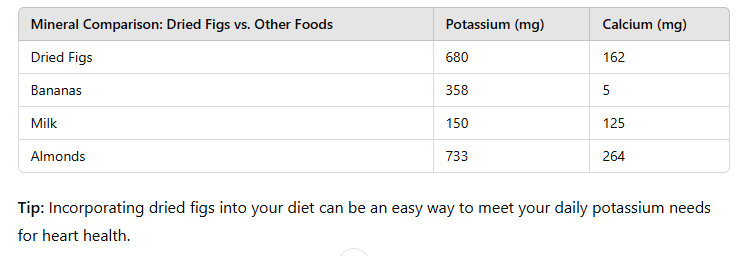
Boosts Bone Health
Dried figs contain calcium, magnesium, and vitamin K, which play crucial roles in maintaining bone health. Just a handful of dried figs provide essential nutrients to help prevent bone-related conditions such as osteoporosis.
Checklist for Better Bone Health:
- Incorporate calcium-rich foods like dried figs.
- Add weight-bearing exercises to your routine.
- Ensure adequate vitamin D levels through diet or sunlight.
Dried figs are a convenient, portable source of bone-supportive nutrients, making them a great choice for on-the-go snacking.
Helps Regulate Blood Sugar Levels
With a moderate glycemic index, dried figs can be a good option for those looking to control blood sugar levels. Although they contain natural sugars, the fiber content slows down sugar absorption, reducing spikes in blood glucose.
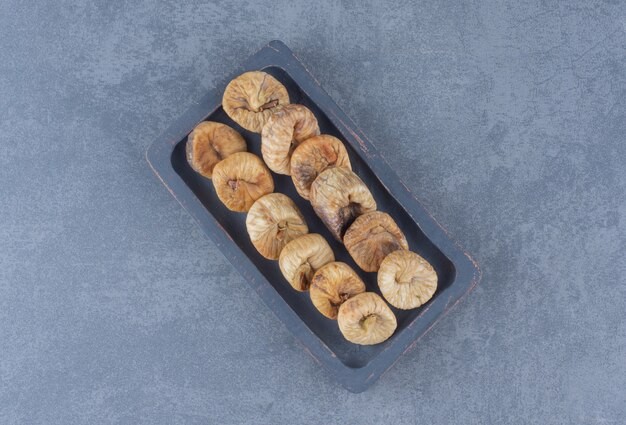
Aids in Weight Management
Dried figs are low in calories yet high in fiber, making them a filling snack that can help with weight management. The fiber in figs not only aids digestion but also keeps you feeling full for longer, reducing overeating.
Dried figs can be an excellent addition to a balanced diet for those trying to maintain or lose weight. They satisfy sweet cravings while providing nutrients without empty calories.
Promotes Healthy Skin
The antioxidants and vitamins in dried figs, particularly vitamins E and C, can contribute to healthier skin. Antioxidants combat signs of aging by reducing oxidative stress, which can lead to skin issues like wrinkles and dullness.
DIY Fig Face Mask Recipe:
- Blend two dried figs with one tablespoon of honey.
- Apply the mixture to your face and leave for 10 minutes.
- Rinse with lukewarm water for glowing skin.
Enhances Digestive Enzymes
Dried figs contain a unique enzyme called ficin, which aids digestion by breaking down protein. This can make it easier for the body to absorb nutrients and improve overall digestive health.
Incorporating figs into meals, particularly protein-heavy dishes, can help balance digestive enzymes naturally.
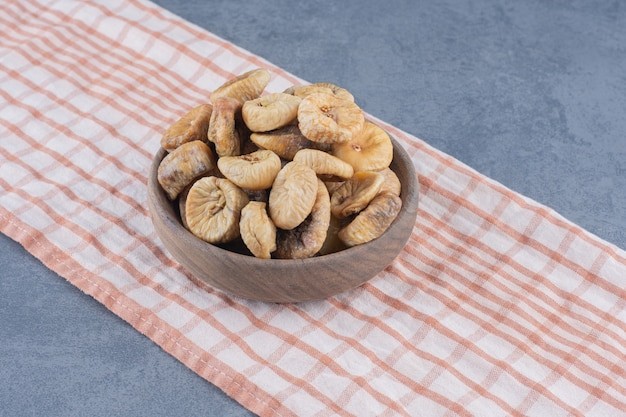
Boosts Iron Levels for Energy
Dried figs are a good source of iron, an essential mineral for red blood cell production. Iron helps transport oxygen throughout the body, vital for maintaining energy levels and preventing anemia.
Iron-Rich Foods Comparison

Lowers Cholesterol Levels
The soluble fiber in dried figs can bind to cholesterol in the digestive system, preventing it from being absorbed into the bloodstream. This process helps lower LDL (bad) cholesterol levels, reducing the risk of cardiovascular disease.
Tip: Pair dried figs with nuts like almonds or walnuts for a heart-healthy snack to help keep cholesterol levels in check.
How to Incorporate Dried Figs into Your Diet
Thanks to their versatility, adding dried figs to your daily meals is easy. Here are some ideas:
- Add chopped dried figs to oatmeal, yogurt, or smoothies for breakfast.
- Snacks: Pair dried figs with cheese or nuts for a balanced snack.
- Desserts: Use dried figs in baking recipes for natural sweetness and added fiber.
With these ideas, it’s easy to enjoy the benefits of dried figs in various delicious ways.

Interview with a Nutritionist: Why Dried Figs are a Superfood
In an exclusive interview with renowned nutritionist Dr. Emily Carter, she shares insights on the health benefits of dried figs. Dr. Carter explains,
“Dried figs are more than just a tasty snack; they’re packed with essential nutrients like fiber, calcium, and antioxidants that support overall health.” She highlights how figs can benefit everything from digestion to heart health. She advises incorporating them into a balanced diet: “Just a handful of dried figs daily can make a big difference in meeting your nutritional need
Choosing and Storing Dried Figs
Selecting high-quality dried figs is essential to getting the best taste and nutrition.
Checklist for Choosing Fresh Dried Figs:
- Texture: Choose figs that are slightly soft but not overly dry.
- Smell: Avoid figs with a sour smell, which indicates fermentation.
- Color: Fresh dried figs should have a natural brown hue without added colors.
Store dried figs in an airtight container in a cool, dark place or refrigerate for extended freshness.

Conclusion
Dried figs are a delicious and nutrient-dense food with numerous health benefits, from supporting digestive health to promoting glowing skin. They’re easy to incorporate into a balanced diet, offering both versatility and flavor. Whether you’re looking to improve digestion, support heart health, or simply enjoy a natural snack, dried figs are an excellent choice.
So, why not make dried figs a regular part of your diet? Visit the Dried Fruits Guide for more healthy tips and recipes to enrich your lifestyle!
FAQs
Yes, dried figs’ high fiber content can keep you feeling full, reducing the likelihood of overeating.
Moderation is key; typically, 2-4 figs daily provide plenty of nutrients without excess sugar.
While naturally high in sugar, the fiber in dried figs balances this out, making them a healthier option than processed sweets.
Yes, the antioxidants in figs can help reduce signs of aging and improve skin appearance.
For freshness, store dried figs in an air tight container in a cool, dry place or refrigerate for a longer shelf life.


